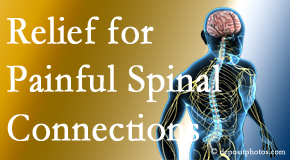Satterwhite Chiropractic Knows Well the Spine and Its Connections
Nerves. Discs. Muscles. The spine connects them all! And back pain is a complex condition typically involving all these components. Your Oxford chiropractor at Satterwhite Chiropractic values all of these spinal elements. Your Oxford chiropractor respects each of these spinal elements. Your Oxford chiropractor relieves Oxford back pain and neck pain associated with these spinal elements with gentle chiropractic services and Cox® Technic at Satterwhite Chiropractic.
THE SPINE
It is the body’s support system. The spine unites everything! The spine’s bones – called vertebrae – link ligaments, muscles and discs to make up this support system. 25 intervertebral discs are between each of the typical 33 vertebrae. Three parts comprise each disc – the gel-like, water/collagen-composed nucleus pulposus contained and held in place by the collagenous annulus fibrosus and two endplates on top and bottom that protect and allow nutrients into the nucleus. The disc keeps the spine flexible and strong. (1) Seemingly off-topic but really not as these findings show just how connected the spine is, more articles surface about the importance of diaphragm training for muscle relaxation like the hamstring muscles. In a new study, this training is shown to increase the thickness of lumbar spine stabilizing muscles, transverse abdominis and lumbar multifidus muscles. (2) Satterwhite Chiropractic is astounded by what diaphragm-focused treatment does for such muscles. It all reflects on how intricately the spine is designed and connected! Interesting! Satterwhite Chiropractic likes taking care of Oxford chiropractic patients’ spines every day!
NERVES
Spinal nerves weave their paths throughout the spine, gathering and dispersing impulses from head to toe. The superior gluteal nerve makes its ways through the lower pelvis by the L4, L5 and S1 nerve roots in the sacral plexus. It innervates the gluteus medius, gluteus minimum and tensor fasciae latae muscles. If injured, it often creates an obviously different walking and standing gait because of the gluteus medius muscle paralysis it triggers. (3) Satterwhite Chiropractic back pain patients understand how sensitive these spinal nerves are and so does Satterwhite Chiropractic.
MUSCLES
The spine relies on muscles to maintain its connections. The psoas muscle runs along both sides of the spinal vertebral column down to the pelvis. It’s deep and originates at the lumbar vertebrae, L1-L4, adjoining much more - the less trochanter of the femur, iliopsoas muscle, psoas major muscle, inconsistent psoas minor muscle, iliac fascia, iliacus muscle, and inguinal ligament – influencing postural function and influencing mood and stress disorders as a reason for low back pain. (4) The quadratus lumborum muscle is essential to stability. Its deep, posterior, lateral and interior location around the spine often draws into question its contributing role in back pain. It’s an important part of the thoracolumbar fascia muscle system as it surrounds the iliac crest, the transverse processes of lumbar spine’s vertebrae and 12th rib. (5) The external oblique muscle is central to balance, maintaining the center of gravity, and stability. Interestingly, in a research study of women with chronic low back pain, stability exercises and balance exercises involving the external oblique muscle improved erector spinae muscle activity and reduced pain and disability. (6) That’s why Satterwhite Chiropractic routinely suggests exercise to Oxford back pain patients as part of the chiropractic treatment plan. Don’t worry! Satterwhite Chiropractic ensures these are simple and helpful for you!
CONTACT Satterwhite Chiropractic
Listen to this PODCAST with Dr. Lonny Skjervheim on The Back Doctors Podcast with Dr. Michael Johnson about chiropractic treatment of low back pain with leg pain together using Cox® Technic spinal manipulation.

